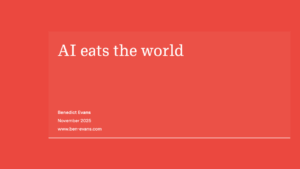The Pivot Conference in NYC in October is unique among events in that, each year, it shifts focus to deeply reflect the needs of its community of senior business transformation executives from leading brands and organizations. To make that happen, I serve as Pivot’s Executive Producer along with Pivot CEO, Mike Edelhart.
For four years in a row, we’ve put our heads together to develop a story arc that covers the hottest, emergent trends, presented by the industry’s most engaging experts over the span of two days. They bring to life my work in digital transformation and the digital customer experience and Mike’s perspective as lead partner for the Social Starts investment fund.
To celebrate the upcoming event next week, Mike and I got together to talk about the story behind this year’s Pivot.
Mike – This is Mike Edelhart, the CEO of The Tomorrow Project, the producers of the Pivot Conference in New York, and I’m here with Brian Solis, executive producer of Pivot, author, partner of the Altimeter Group, and friend. Hey Brian!
Brian- Hey Mike, I can’t believe we are back at it again – it seems like yesterday we did the last Pivot Conference.
Mike- I know, we’ve been at this now four times, I guess, and each time, at least in my experience (and I expect in yours) it’s been a little different – and we do that on purpose – so maybe that’s a good way to start. From your point of view, what do you think has made Pivot unique and what do you think makes it particularly unique this year?
Brian- You know, the thing that I love about Pivot is it first starts with working with you, working as friends, it becomes a real personable conference. We all go to these conferences to get smarter, to meet people and network. Then there are conferences like Pivot where you really start to feel a part of a community – part of a movement is probably a better way to describe it – and I think that’s what made Pivot really special for me and what keeps me coming back every year is that you can actually see progress in the themes and in the people we bring together and in the careers of those who advance who attend Pivot – we’re really pushing things forward and I feel a little proud to be a part of it.
Mike- Yes, same here. We’ve talked about this since the very beginning of Pivot – the senior executive community we serve, the world that’s being transformed by social and mobile technology, keeps changing and we need to change with it and at least for me, one of the things about this year that’s most exciting is the notion that we have a two day conference where each day is essentially a one-day event unto itself, trying to get our arms around the breadth of what’s happening out there for the companies we serve now. We’ve all decided that the first day is about business transformation.
What does business transformation mean for you? I know you’ve written about it. When we say to folks: “come to Pivot on the first day – we’re doing business transformation” – what does that mean for you?
Brian- There’s this way of doing business, the way that always been done – you look at the classics, the business models that we’ve been taught in school. But you have technology that has continued to evolve to the point where now the machine is an extension of the person. Everybody sort of jokes around that the next evolution of human beings is that everybody’s hands are going to be little bit longer so that they can accommodate texting and multitasking on one screen a lot more efficiently.
In all seriousness, transformation starts to look at people first, it’s going back to the basics of just who are the people that we want to do business with? And why would they want to do to business with us? Who are the people that we want to work with us to do a better job and how do they want to work? This is the transformation – a much more human approach when we say “wow- those processes, those systems, those reward-mechanisms, those policies that we have, I mean everything is open to change.
That’s what really inspires me.
Mike- I think that’s right. I’ve sometimes described it as the companies that we work with are being compelled to reconfigure and redecorate the house whilst still living in it and that’s a significant challenge. We know Pivot – we’ve been doing it for a while – we know the community that comes to Pivot but obviously not everybody does. So, if somebody is listening to this or reading about this conversation, what kind of executive do you think will get the most value out of what we are going to be doing on Day 1 of Pivot, which by the way is the 16th of October; Pivot is going to be 16th and 17th at the NASDAQ this year, which is a pretty cool venue.
Brian- I am really excited about that. I love the approach that we’re taking this year – we’ve always been a two day conference and it was always a lot for people to digest and, by breaking it up into two different groups, the first group I see really as the decision makers or the lead strategist. Anybody who really is looking for the vision and the inspiration to go back into their organization and lead from the top down – to bring the right people together to lead in new directions or to research new opportunities but to be able to do so with authority.
I am truly curious to see how well that day evolves or unfolds because we’ve put together, as you know, a really incredible program for Day 1 because we really want to show those executives and decision makers what’s changing, how it’s changing, why it’s changing and then give people the full rounded story and the details necessary – but at a high level – so that they’re going to go back with “we are going to do this, or we need to know this and this and this” – and that’s pretty interesting to me.
Mike- I agree and we’ve talked a bit here about the fact we have two days and two different areas of focus, so we should probably talk about the second day as well which is going to be focused on where things stands now for big companies struggling to stay ahead of change related to marketing and influencing communication, and it gets me thinking back to that very first Pivot where all we cared about was Millennials – “the kids won’t behave” – well, actually everybody is behaving differently; The rise of the social consumer in the second Pivot and then the question of social brand and social business in the third Pivot. So, it leads to the natural question: What do you think the current state of social marketing is now? When we talk about social marketing at Pivot, where do you think we will be focusing our attention?
Brian- Well, I hope to be focusing our attention on areas that really show the breadth of social impact because what it really does come down to, in my view, is that social has democratized information, democratized audiences, networks, markets and that’s only becoming more profound as every day passes. So, when we talk about social, what we’re talking about is this great equalizer and how do we look at everybody who is not behaving the way you think they’re behaving.
One of the things that still surprises me, for example, is when a company says, “ok, the customers are different and technology is different, so what are we going to do? Let’s map the customer journey so that we know where to make investments and prioritize those on a road map”. Yet they’re still making the same assumptions they’ve always made about their customers. When we talk about social, it is exactly that – becoming part of the community, understanding your customer or your employee or your influencer or your detractor and where those touch points are. How do you use them for advances?
So that you can become part of those communities and redefine what the journey is. Not what you think it is but what it should be and then make the investment not just in technology and road maps but also in processes. How should things be different?
Do I really have to go through six different screens to be able to make a decision or a purchase because your process doesn’t work on the back end? There is one company that I was working with that said “our best customers get the worst experience” and by that they meant that they had so many different product lines but none of those product lines act as one company – every product has its own company and none of those systems talked to one another.
The whole idea of social, to me at least, and what I hope people will take away from that is to recognize that, in order to become relevant in any market or any community, you have to become part of it and that’s a philosophical switch as much as it’s a business and a technology investment.
Mike- I agree completely. It’s all in the end about human beings and the fact that we can now see through analytics and emerging capabilities, the complexity that the variety of human experience make. So across this big arc of experience we are going to have at Pivot this year, I’m curious as to what part of the program are you most looking forward to being part of?
Brian- There is a one part that I am really looking at and is that around the sharing aspect of the economy and how this is gathering a lot of momentum. The taxi medallion, for example, was always considered one of the best investments and there was a real interesting piece done out of Chicago that shows how that medallion is a great risk because of challenges like Uber, and we all tend to look at Uber and AirBnB as the most common examples of disruption in the sharing economy. But what we’re really going to look at, and what I am excited about, are two things, and – putting the share in the economy in the whole buzz around it aside – what is it that businesses need to do or understand about this disruption in order to still be relevant three or four years from now.
That’s such a huge discussion. What are the psychological drivers for consumers as to why this stuff is even interesting to them. There’s another one too – the whole idea of just the intelligent supply chain and democratization of the manufacturing process – where GE, for example, is investing in 3-d printing of certain parts but they’re also bringing the internet into things and turning parts into communication devices. Those are the things I am really fascinated about because they really represent just two aspects of what the future of businesses looks like.
What are you looking at, Mike?
Mike- What I call the aggregation of everything – the emergence of the impact of this upon the supply chain is really fascinating and I can’t wait to hear what guests say about it at Pivot this year. At my end doing my job as an early stage investor, we’re starting to see companies emerge and challenge the big companies. Organizations that don’t own the goods, that don’t own the transportation network, that don’t own the factory, that don’t have any stores – and produce a great product at an amazing price and a customer service experience superior to traditional companies. That’s something that was almost unimaginable even a few years ago and I think it’s going to be central to the way the rising generations choose to do business and I think it’s going to be a critical and fascinating topic at Pivot this fall.
Speaking about Pivot and some of the work that you have done – I mean you have written about the ends of things, the end of business as usual and you have written about the future of things, the future of business; so I am curious – Pivot changes each year, we talk each year about how the world we’re part of is changing and how the executives we’re here to serve keep getting challenged in new ways. So, what do you think the future of Pivot holds?
What do you think we’ll be doing next October? What do you think we’ll be doing five Octobers from now? Where – sort of as the mind behind Pivot – would you want Pivot to go or see Pivot heading?
Brian- Well, Mike, you’re turning this conversation into a strategy session. Let’s see, I didn’t do my homework on that one but if I had to think about it, I would want to see us continue –because I don’t want to say we’re not doing that – every year the event is different because we practice what we preach and looking at how we can make the event better; how we can make the experience better. I think that’s really what I am looking for the future of Pivot – is that why does it has to be just one event and why does it have to be just that one event once a year?
What if we made Pivot alive every day?
What if we were bringing the most amazing people in front of the most amazing people in various ways every week, keeping the Pivot spirit alive, because change is only going to accelerate, right? Disruption is only going to accelerate, so the need to get inside and find inspiration and information is going to happen more than once a year, and we’ll find ways to bring people together in real world because that is just as important but I think that, following this theme, by 2015 we might start to see a living and breathing Pivot.
Mike- I think that would be terrific and I think events like Pivot are going to be subject to the same transformation and change related forces as every other business and I think we have to not only follow that but, being Pivot, lead and understand how the world of being a senior executive in a company under stress is changing and how we can constantly look at new ways to reach out and help our community, help themselves and get ready for what’s going to be a fascinating but challenging future.
I think on that note we can maybe wrap it up with one last thought from you- if you’ve got one – for both our community and for folks who may not know us yet but we’d like to have come join us and get to know what we can do with Pivot this fall.
Brian- I think that people should know that in Pivot you’ve got a couple of folks here looking out for you – your job, your business and we’re thinking about the stuff that we know you’re thinking about too. What we’re really trying to give you is the confidence and also the information, the evidence necessary to go back and bring about change wherever you are in the organization and, while there are a lot of great conferences out there, a lot of smart conferences out there, we think of you as the stakeholder trying to do something and we are trying to help you to do that and that’s our motivation
Mike-You know, I think that is absolutely it – a couple of Pivots ago you created an epiphany for me when you said from the stage: “Pivot – this isn’t a conference, this is the physical embodiment of an extra ordinary community” and I think that gets it exactly right. I think it’s what we were trying to do then, it’s what we are trying to do now and, as much things may change in the future, it’s what we are dedicated to do going forward – it’s been great ride – I have huge respect for you and have had great fun working with you and can’t wait to do it again next week.
Brian- I am really excited for this and, as we know, it will be over before we realize it and then we’ll be up for 2015. I can’t think of a better person to want to work with on that front.
Mike- Same here and I can’t wait and look forward to see everyone here in New York, October 16th and 17th.
Pivot Conference takes place October 16-17 at the NASDAQ Marketsite in Times Square NYC. Pivot is an invitation-only event for senior executives who lead social, mobile and business transformation initiatives for major corporations. Requests for invitation should be directed to: Matt Godson, matt@momentumevents.com













Leave a Reply